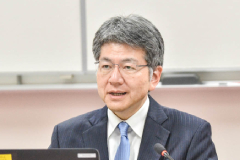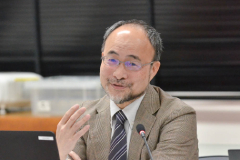JICA/UNDP Seminar on Compounded Crises and Human Security: Introducing JICA Ogata Research Institute Report ‘Human Security Today’
2023.05.09
Our world is facing more complex and diverse threats than ever before. Armed conflicts and natural disasters, the COVID-19 pandemic, energy and food crises triggered by the war in Ukraine, and longstanding challenges such as climate change, all threaten human security around the globe.

Tanaka Akihiko, president of JICA
On March 1, 2023, in cooperation with the United Nations Development Programme (UNDP), the JICA Ogata Sadako Research Institute for Peace and Development (JICA Ogata Research Institute) convened a seminar to introduce the English version of the first issue of its flagship report “Human Security Today.” International experts gathered to deepen the discussion on the concept and practice of human security.
The event began with opening remarks from Tanaka Akihiko, president of JICA. Tanaka stressed the importance of human security—the concept aiming to build resilient and sustainable societies by placing every single human being at the center of security— particularly in today’s world facing compounded crises. He explained that the essence of human security—freedom from fear and want, and the preservation of human dignity—is as old as the history of modern political thought, though human security attracted attention only after the end of the Cold War. He also stated that national security, which is often emphasized under the current international circumstances, is a means to achieve human security.
Following Tanaka’s remarks, Professor Emeritus at The London School of Economics and Political Science, Mary Kaldor, praised JICA’s report for emphasizing the importance of researching human security practices, in particular its local, bottom-up approach to human security. Kaldor also highlighted the need to transform the military into an organization designed to protect ordinary people.

Mary Kaldor, professor emeritus at The London School of Economics and Political Science
In his keynote, Takahara Akio, the then-executive director, JICA Ogata Research Institute, pointed out that crises are easily compounded in a globalized world as shown in the case of the Ukraine crisis. He emphasized the importance of human security as a foundational value for the solidarity and collaboration of people in the divided world.

Takahara Akio, then-executive director, JICA Ogata Research Institute
To achieve human security, he noted that combined approaches are needed, and stressed the importance of mechanisms for checks and balances of power such as rule of law. As an effort to contribute to building such mechanisms, Takahara introduced JICA’s initiatives on legal and judicial assistance to promote the rule of law in Asia and Africa. Takahara also explained that raising individual capabilities through education is essential, and that cooperation with the locals to enhance the resilience of societies and communities while respecting and utilizing local history and institutions is also indispensable.
In closing, Takahara responded to skepticism of the concept of universal values by underscoring that the endogenous achievement of the preservation of people’s lives, livelihoods, and dignity is a transcultural value that applies to all people of the world. He also affirmed JICA’s commitment to conducting theoretical and empirical research on human security to realize this value for all people.
Makino Koji, author of the first chapter of the report and the then-director general, JICA Ogata Research Institute, provided an outline of the report, beginning with its purpose: to explore how human security can be understood within the context of compounded crises as well as to identify effective approaches to protecting human security. The report provides a broad overview of human security and development cooperation today, and the history of human security research with a focus on JICA’s efforts. It also looks specifically at COVID-19 and human security with sections dedicated to understanding and practicing human security in Africa, migrant remittances and human security, and the relationship between COVID-19 and the healthcare system from the perspective of human security.

Makino Koji, then-director general
Citing JICA’s Initiative for Global Health and Medicine against COVID-19, Makino underscored the efficacy of combining protection and empowerment approaches, and further offered the pandemic as an example of a compounded crisis that requires a multisectoral approach and strong partnerships among various stakeholders. Finally, Makino presented three transformations to promote human security: creating shared value transformation, digital transformation, and global governance transformation. Makino’s presentation closed with a brief video introduction to the report.
During the panel discussion moderated by Muto Ako, executive senior research fellow, JICA Ogata Research Institute, Mehrnaz Mostafavi, chief of the Human Security Unit at the United Nations reiterated the threats facing human security today and described the purpose of the United Nations Trust Fund for human security as supporting a comprehensive security architecture that begins with people and is both universally applicable and responsive to local contexts.

Participants at the discussion
Next, Attorney Raissa Herradura Jajurie, deputy floor leader, Bangsamoro Transition Authority (BTA) parliament and minister of social services and development, presented on the efforts to bring human security to Bangsamoro Autonomous Region in the Philippines. In her presentation, Jajurie summarized the history of conflict in the region, which resulted in widespread destruction, under-development, and poverty. She also explained the current situation in the region highlighting the achievements and the challenges and concluded with the future plans to enhance human security in the region.
Finally, Kondo Tetsuo, Director, UNDP Representation Office in Tokyo, went on to describe the historical development of the concept of human security. He noted that UNDP published the Special Report on Human Security in 2022, which underscores “solidarity” as the key strategy to address threats in the age of Anthropocene.
Following these presentations, the questions were raised for the panelists. In response to the question on the most important thing for human security in practice with regard to people’s empowerment, Mostafavi answered that an inclusive and participatory approach to community engagement is critically important for empowering people to advance human security. To the question on people’s empowerment, Jajurie stated the need to maintain balance between protecting the confidentiality of negotiations and the right of the people to understand what is happening while describing the peace process in the Philippines. To the question on UNDP’s practice on the ground, Kondo introduced UNDP approaches to human security on the ground and highlighted the significance to enhance the agency of each actor. He added that with this regard, “agency” is considered to be automatic actions and independent decision making, not influenced by anybody, but with tendency to think about others first.
Seminar "Compounded Crises and Human Security - Introducing [Human Security Today]"
JICA Ogata Research Institute Report “Human Security Today” (No.1, 2022): Revisiting Human Security

事業事前評価表(地球規模課題対応国際科学技術協力(SATREPS)).国際協力機構 地球環境部 . 防災第一チーム. 1.案件名.国 名: フィリピン共和国.

事業事前評価表(地球規模課題対応国際科学技術協力(SATREPS)).国際協力機構 地球環境部 . 防災第一チーム. 1.案件名.国 名: フィリピン共和国.

事業事前評価表(地球規模課題対応国際科学技術協力(SATREPS)).国際協力機構 地球環境部 . 防災第一チーム. 1.案件名.国 名: フィリピン共和国.

事業事前評価表(地球規模課題対応国際科学技術協力(SATREPS)).国際協力機構 地球環境部 . 防災第一チーム. 1.案件名.国 名: フィリピン共和国.

事業事前評価表(地球規模課題対応国際科学技術協力(SATREPS)).国際協力機構 地球環境部 . 防災第一チーム. 1.案件名.国 名: フィリピン共和国.